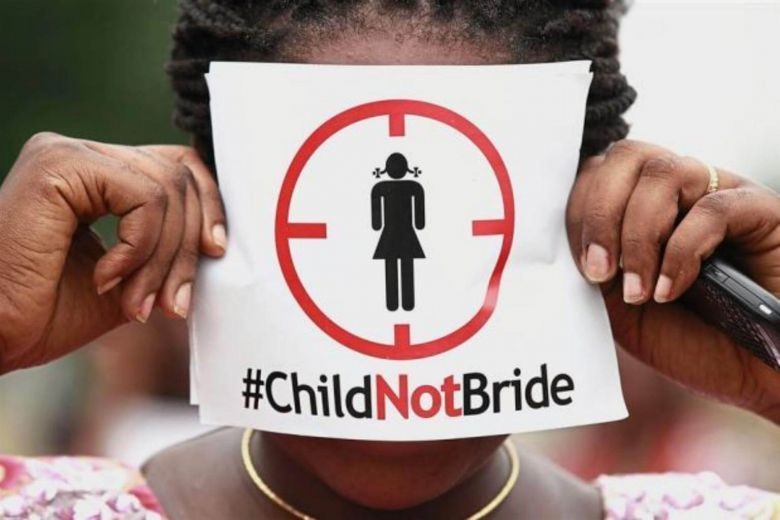Popular Reads
Top Results
Can't find what you're looking for?
View all search resultsPopular Reads
Top Results
Can't find what you're looking for?
View all search resultsChild marriage still common, despite Indonesian court ban
A 2019 study conducted by the Australia Indonesia Partnership for Justice (AIPJ2) revealed that religious courts have approved an average of 12,000 exemptions every year.
Change text size
Gift Premium Articles
to Anyone
When her parents brought her home from school, 14-year-old Dewi, not her real name, had the surprise of her life.
An adult man, who was later revealed as a widower with children, had been waiting behind the doors of her house for one purpose: to marry her.
“I was devastated at the time. I still wanted to go to school and see my friends. But my parents said that the [marriage] could help the family's economy. So, I couldn’t say no,” she said.
As she was still underage, her parents and soon-to-be husband doctored the necessary documents by changing her date of birth with the help of local brokers. But her husband soon become violent, going into rages and throwing furniture whenever he became upset. He also neglected to support her financially. They divorced after six months of marriage.
Now 40, Dewi is among the thousands of women in Indonesia who was forced into child marriage. According to an Indonesia Statistics (BPS) report in 2015, one in every four married women aged 20 to 24 were married before they were 18.
Compelled by her harrowing experience, Dewi and two other victims of child marriage filed a lawsuit nearly three decades after Dewi’s divorce. They challenged the 1974 law on marriage, which she said was discriminative toward women.
The marriageable age limit for men is 19 and 16 for girls, contradicting a 2014 law on child protection that defined children as "younger than 18 years old".
Ultimately, the Constitutional Court (MK) granted Dewi’s demands in December by ordering lawmakers to revise the age limit within the next three years.
Government officials assured in a discussion on child marriage on Monday that the matter would be addressed soon but provided no further details on a plan.
The Constitutional Court ruling has pushed Amran Suadi, head of the Supreme Court’s religious affairs chamber, to formulate a clearer regulation for religious court judges to provide exemptions for marriages involving children. Critics have criticized it as a loophole for child marriage.
“Judges will also be taught the psychology behind child development […] so that they can make better rulings when providing exemptions,” Amran said.
A 2019 study conducted by the Australia Indonesia Partnership for Justice (AIPJ2) revealed that religious courts have approved an average of 12,000 exemptions every year.
Furthermore, the Indonesian Child Protection Commission (KPAI) revealed that only 5 percent of child marriages were given court exemptions, suggesting that the remaining 95 percent were carried out with falsified documents, such as in Dewi’s experience.
The Religious Affairs Ministry’s director for family affairs and the Religious Affairs Office (KUA), Anwar, conceded that some KUAs allowed child marriages with only a letter from the subdistrict head — which flouts the 1974 law that requires an exemption letter from courts for underage marriages.
To prevent such practices, his team created an online administrative system integrated with electronic IDs (e-KTP) in November, which could help officials identify underage brides and grooms.
“However, the system and age limit will not completely prevent child marriages,” said Anwar, who suggested a marriageable age limit of 21 for the 1975 law revision.
“Joint advocacy [from various ministries] is needed. For instance, the Education and Culture ministry can enforce its 12-year compulsory education to [prevent] child marriages.”
Likewise, Woro Sri Hastuti Sulistyaningrum of the National Development Planning Board (Bappenas) highlights the need for ministries to consider cultural and economic conflicts that incite child marriages.
A 2018 BPS report further confirms the claim as women in the poorest category has the highest percentage of underage marriage, nearly three times more than wealthier groups.
Similarly, provinces in Kalimantan and Sulawesi have consistently been the most prevalent in the last 10 years, which Woro blamed on their deep-rooted culture in embracing early marriage.
“The MK’s ruling is a great step toward child marriage prevention,” Woro said. “But the task now requires teamwork [from each ministry] to execute it. We simply cannot work alone.”
In the meantime, child marriage victim Dewi expressed hope that the revision would be finished prior to the three years promised by officials because of the uncertainties revolving around it.
“I don’t want to see my friends drop out of school because of child marriage. I just want all Indonesian women to obtain [an education] and become smart,” Dewi said. (mai)









